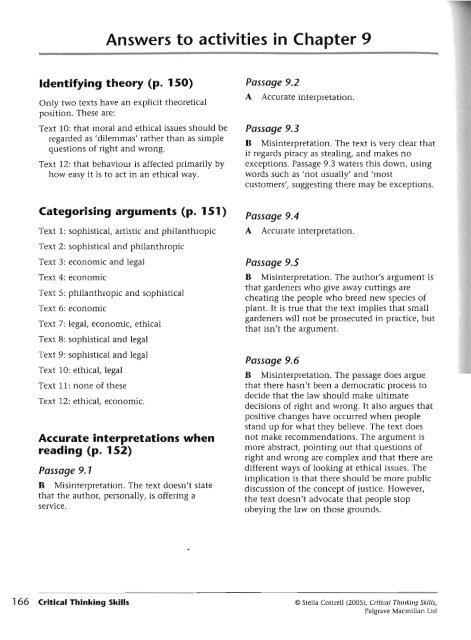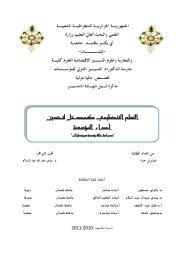Critical Thinking Skills - Developing Effective Analysis and Argument(2)
Critical Thinking Skills - Developing Effective Analysis and Argument(2)
Critical Thinking Skills - Developing Effective Analysis and Argument(2)
Create successful ePaper yourself
Turn your PDF publications into a flip-book with our unique Google optimized e-Paper software.
Answers to activities in Chapter 9<br />
Identifying theory (p. 150)<br />
Only two texts have an explicit theoretical<br />
position. These are:<br />
Text 10: that moral <strong>and</strong> ethical issues should be<br />
regarded as 'dilemmas' rather than as simple<br />
questions of right <strong>and</strong> wrong.<br />
Text 12 that behaviour is affected primarily by<br />
how easy it is to act in an ethical way.<br />
Categorising arguments (p. 151)<br />
Text 1: sophistical, artistic <strong>and</strong> philanthropic<br />
Text 2: sophistical <strong>and</strong> philanthropic<br />
Text 3: economic <strong>and</strong> legal<br />
Text 4: economic<br />
Text 5: philanthropic <strong>and</strong> sophistical<br />
Text 6: economic<br />
Text 7: legal, economic, ethical<br />
Text 8: sophistical <strong>and</strong> legal<br />
Text 9: sophistical <strong>and</strong> legal<br />
Text 10: ethical, legal<br />
Text 11: none of these<br />
Text 12: ethical, economic.<br />
Accurate interpretations when<br />
reading (p. 152)<br />
Passage 9.7<br />
B Misinterpretation. The text doesn't state<br />
that the author, personally, is offering a<br />
service.<br />
Passage 9.2<br />
A Accurate interpretation.<br />
Passage 9.3<br />
B Misinterpretation. The text is very clear that<br />
it regards piracy as stealing, <strong>and</strong> makes no<br />
exceptions. Passage 9.3 waters this down, using<br />
words such as 'not usually' <strong>and</strong> 'most<br />
customers', suggesting there may be exceptions.<br />
Passage 9.4<br />
A Accurate interpretation.<br />
Passage 9.5<br />
B Misinterpretation. The author's argument is<br />
that gardeners who give away cuttings are<br />
cheating the people who breed new species of<br />
plant. It is true that the text implies that small<br />
gardeners will not be prosecuted in practice, but<br />
that isn't the argument.<br />
Passage 9.6<br />
B Misinterpretation. The passage does argue<br />
that there hasn't been a democratic process to<br />
decide that the law should make ultimate<br />
decisions of right <strong>and</strong> wrong. It also argues that<br />
positive changes have occurred when people<br />
st<strong>and</strong> up for what they believe. The text does<br />
not make recommendations. The argument is<br />
more abstract, pointing out that questions of<br />
right <strong>and</strong> wrong are complex <strong>and</strong> that there are<br />
different ways of looking at ethical issues. The<br />
implication is that there should be more public<br />
discussion of the concept of justice. However,<br />
the text doesn't advocate that people stop<br />
obeying the law on those grounds.<br />
166 <strong>Critical</strong> <strong>Thinking</strong> <strong>Skills</strong> O Stella Cottrell (ZOOS), Criticnl <strong>Thinking</strong> <strong>Skills</strong>,<br />
Palgrave Macmillan Ltd



